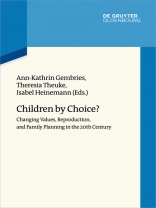During the 20th century, medico-technical advances such as the invention of the latex condom (1930), the arrival of the contraceptive pill on the free market (1960/61) and the birth of the first child conceived by in vitro fertilization (1978) contributed to the fact that in Europe and the USA, the planning, conceiving and making of children was increasingly perceived as a matter of individual and collective decision-making.
Especially since mid-century, these societies underwent profound political, economic and cultural evolutions. In the realm of human reproduction the relationship between the possible, the desirable, and the permitted had to be continually renegotiated.
This volume examines in nine chapters how thinking, speaking and acting changed with regards to reproduction and family planning throughout the modern and post-modern period. Applying an international comparative perspective, the study specifically focuses on the role of value changes underlying these transformation processes.
Über den Autor
Isabel Heinemann, Universität Münster; Ann-Katrin Gembries, Universität Mainz; Theresia Theuke, Universität Mainz












